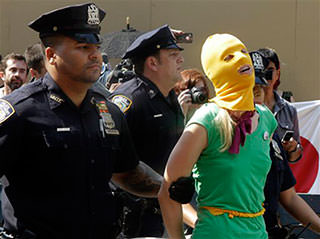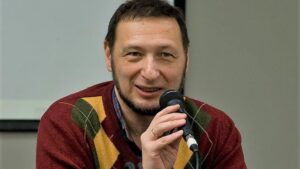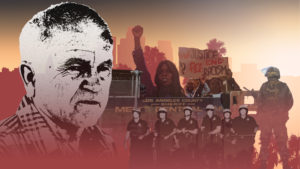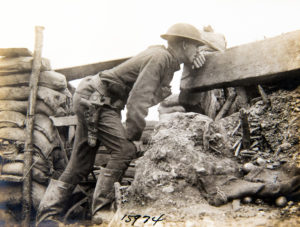How Pussy Riot Helps Putin
The Pussy Riot case has become an international PR disaster for the Russian government, but domestically Russia's conservative majority is rallying behind Vladimir Putin.The Pussy Riot case has become an international PR disaster, but Russia's conservative majority is rallying behind Vladimir Putin.
Three members of the feminist band Pussy Riot were sentenced Aug. 17 to two years in a Russian penal colony because they performed a “punk prayer” in a Moscow church. The trial in Judge Marina Syrova’s courtroom and the draconian punishment of Nadezhda Tolokonnikova, Maria Alekhina and Yekaterina Samutsevich have drawn widespread domestic and international criticism. There were demonstrations in favor of Pussy Riot all around the world. Dozens of musicians and artists, among them Madonna and Paul McCartney, called for the young women’s release — two of the convicted are mothers of small children. U.S. Ambassador to Russia Michael McFaul termed the sentence “disproportionate to the crime.” High Representative of the EU for Foreign Affairs Catherine Ashton called the independence of Russia’s courts into doubt, and German Chancellor Angela Merkel went so far as to question the country’s commitment to “fundamental rights and freedoms.”
Some of the reactions domestically were also negative. Hundreds of people demonstrated against the verdict in front of the court, and about 100 of them were arrested. Former Finance Minister Aleksei Kudrin stated that the ruling undermined citizens’ trust in Russia’s justice system even further, and Samutsevich’s father opined that Russia was headed in the direction of theocracies like “Iran and Saudi Arabia, where one can be stoned on religious grounds.” The Russian Orthodox Church maintained that the women had committed blasphemy, but called upon the state to “show mercy for the convicted within the framework of the law in the hopes that they will refrain from repeating their sacrilegious acts.” A spokesman for Vladimir Putin said that the Kremlin accepted the verdict and that the president had no means of intervening in the judicial process.
However, politics stood at the center of the Pussy Riot case throughout the trial. The matter began when five members of the punk collective rushed the Cathedral of Christ the Savior on Feb. 21 in order to protest against Putin’s re-election and the support of him by the patriarch of the Russian Orthodox Church. Even though they were quickly arrested, the group managed to produce a video in which it conducted a punk prayer asking the Virgin Mary to “put Putin away.” In the song, Pussy Riot criticizes the Orthodox Church’s discrimination of women and its close connection with politics, calling Putin the church’s “chief saint.” The chorus states, “shit, shit, the Lord’s shit!”
In her ruling, Syrova singled out the last line as blasphemous and judged Pussy Riot’s act as “incitement to religious hatred.” Russian law does not punish blasphemy; instead, the three women were convicted of “hooliganism,” a catchall charge that is used to chastise a variety of people including rowdy football fans and neo-Nazis committing racist attacks. It carries a maximum sentence of seven years in prison. Seen from this perspective, the verdict is relatively mild, as many observers had feared at the beginning of the trial that the prosecution would push for the maximum penalty. However, during his stay at the London Olympics and in the face of mounting international criticism, Putin called for clemency. A few days later, the prosecutor asked for a punishment of three years. The final sentence was slightly lighter.
Syrova, who was also involved in the second trial of jailed plutocrat Mikhail Khodorkovsky and has — according to the Internet platform Openspace.ru — issued only one acquittal in 179 cases, made it very clear that others should consider the prison term for Pussy Riot as a warning. It is no secret that this warning also applies to the opposition at large: The government is unwilling to allow for a repetition of last winter’s mass protests. Shortly before its summer break, the Duma passed a series of legal measures for this purpose. They include imposing hefty fines on participants of unsanctioned meetings and requiring nongovernmental organizations receiving funds from abroad to register as “foreign agents.” Moreover, charges were brought against several opposition figures. Blogger and anti-corruption activist Alexei Navalny has been accused of embezzlement and faces a maximum punishment of 10 years in prison. Most recently, chess champion and political activist Garry Kasparov was arrested, and apparently beaten, during a protest against the Pussy Riot verdict. He now faces charges of having bitten a policeman, which carry a prison sentence of up to five years.
In all these cases, the authorities have taken great care to deny any political motivations. Instead, they stressed legal and moral concerns. Pussy Riot’s defense argued that the punk prayer had been a political protest against Putin. The three defendants also apologized for offending believers with their actions. Samutsevich said the group chose the main Orthodox cathedral in Moscow because it had become a “flashy setting for the politics of the security services, which are the main source of power” in Russia. The cathedral, which was destroyed under Josef Stalin and rebuilt under Boris Yeltsin, is indeed the central symbol for the unity of state and church in Russia. Samutsevich does not believe that the band members would have been tried if they had not spoken out against Putin: “It seems to me that if we had sung ‘Mother of God, protect Putin’ or ‘Mother of God, keep the feminists away,’ we would not be sitting here,” she said.
Syrova, however, dismissed all political arguments as false pretense. Instead, she sided with the prosecution (and state media) in portraying the three defendants as mentally unstable and anti-social. Nonetheless, the court’s experts maintained that in spite of “personality disorders,” they were sane and could thus be held accountable for their actions.To many Russians, therefore, Pussy Riot appears as an irreverent and possibly extremist organization. Rodrigo von Horn, a German specialist on Russia who observed the trial closely, told Truthdig that the prosecution repeatedly insisted on the “psychological damage” Pussy Riot’s actions inflicted with its punk prayer: “Implicitly, this also emphasized the church’s role as the ideological foundation of the Russian state’s stability,” he said. In this context, a seemingly minor infraction suddenly becomes a threat to the entire political system. Two lawyers who represented a cathedral security guard, one of the prosecution’s many “injured parties,” made it clear that they considered the three defendants to be part of a larger conspiracy against Orthodoxy and the Russian state. One of them even drew an explicit connection between the attacks against the Twin Towers in New York and Pussy Riot: “In the first instance it was a satanic group, and in the second it was the global government. But at the highest level both are connected — by Satan,” the lawyer said.
These kinds of bizarre conspiracy theories do little to lend legitimacy to the verdict. They do, however, help to explain the severity of the punishment and the treatment of the defendants during the trial. The defense did not receive all necessary materials in time, and the judge rejected most of its witnesses during the trial. The defendants complained of sleep deprivation and humiliation. They were forced to sit in a cage throughout the trial, guarded by a fierce Rottweiler and elite soldiers. All of this underlined the impression that these young women were highly dangerous enemies of the state. Not surprisingly, Russian officials — and some non-mainstream commentators like Mike Whitney in CounterPunch — responded to criticism of the trial by quoting the American treatment of enemy combatants and alleged state-secrets leaker Pfc. Bradley Manning. It remains unclear, however, how an American violation of constitutional rights justifies judicial arbitrariness in Russia (see Chris Randolph’s rebuttal in CounterPunch).
The Pussy Riot case has become an international PR disaster for the Russian government. Domestically, however, it may contribute to rallying support for Putin’s government. To the conservative majority of Russians, estimated at about 60 percent, the trial has shown that the country’s authorities strengthen Russia’s ideological and religious foundations. A recent poll of Russians by the Levada-Center showed that 44 percent consider the trial to have been fair and objective, and an additional 36 percent believe that the punishment corresponds to Pussy Riot’s guilt. Moreover, 41 percent considered the punk prayer to be an offense against the Orthodox community, and only one-quarter saw political reasons behind the trial. In this sense, the case will probably assist the Kremlin in consolidating its conservative base. However, frustration only deepens among the growing urban and cosmopolitan sectors of Russian society, whose calls for reform fall on deaf ears. Most likely, this will motivate even more young and talented Russians to leave their country rather than hope for change at home.
Your support matters…Independent journalism is under threat and overshadowed by heavily funded mainstream media.
You can help level the playing field. Become a member.
Your tax-deductible contribution keeps us digging beneath the headlines to give you thought-provoking, investigative reporting and analysis that unearths what's really happening- without compromise.
Give today to support our courageous, independent journalists.






You need to be a supporter to comment.
There are currently no responses to this article.
Be the first to respond.